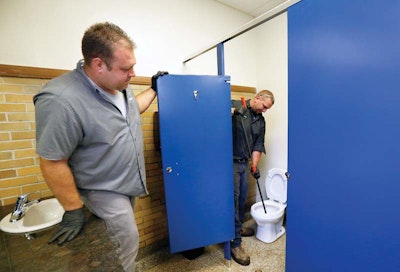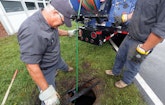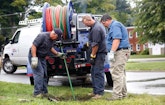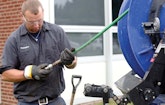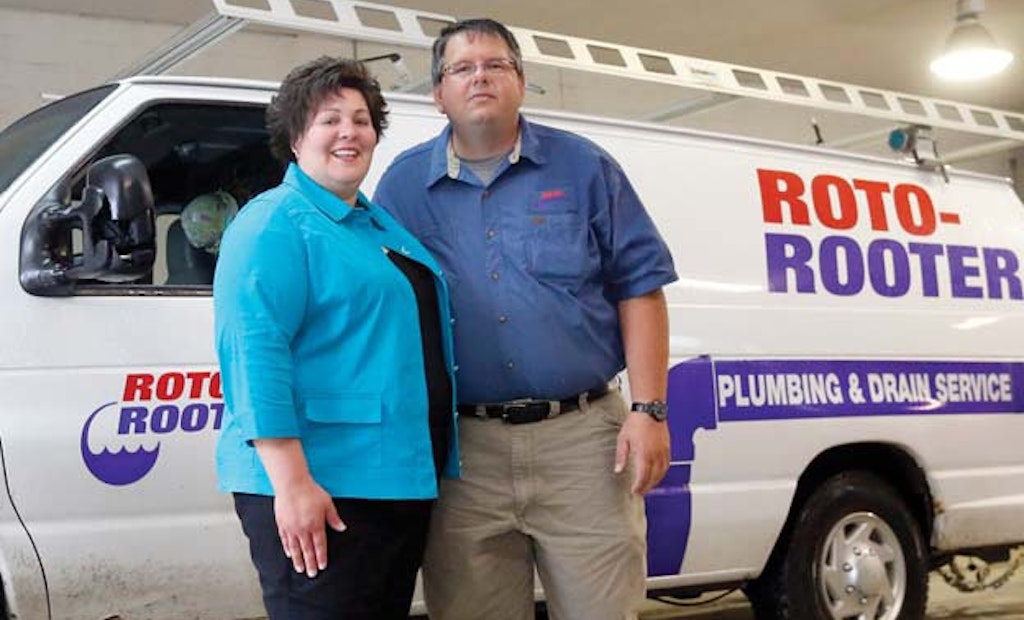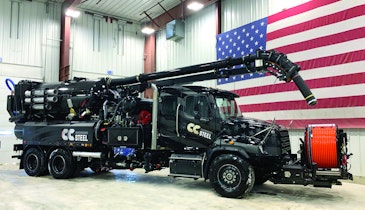Interested in Cleaning?
Get Cleaning articles, news and videos right in your inbox! Sign up now.
Cleaning + Get AlertsJames Carney III has watched business ebb and flow at his rural Ohio Roto-Rooter franchise. Like most drain cleaners, he tries to maintain the flow.
Carney’s father started the business in Ashtabula County in 1969. The younger Carney came on board full time in 1992 in an era of change for the company: They discontinued septic services, secured their master plumber licenses and began providing full plumbing service.
Another opportunity opened up at around the same time — underground emergency repair services — and the company began handling everything from sanitary sewer repair to storm sewer work and waterline repair and replacement in the county.
“Roto-Rooter has been very good for us,” Carney says. “The franchise supports us with their own line of drain cleaning equipment, which is about the best out there. It is a good line. Over the years, the Roto-Rooter name has also been a benefit in bringing in business.”
High-quality equipment to get the job done
The plumbing and sewer sectors function with three technicians working under Carney’s plumbing license. The team handles CCTV inspection of smaller lines with a RIDGID SeeSnake, and larger lines with a camera system from Amazing Machinery.
“Having the cameras has taken all the guess work out of the equation,” Carney says.
CCTV inspection pinpoints root intrusion issues, which are problematic in the older cities with an abundance of trees. The recently purchased Sewer Equipment Model 747 trailer jetter (2,000 psi/40 gpm) is very helpful in tackling the root issue.
Their three service vans include two 3/4-ton Ford E-350s and an E-150. One E-350 is dedicated entirely to sewer cleaning, while the other two trucks have drain cleaning and plumbing equipment. He estimates inventory on the combo trucks to run from $10,000 to $12,000. The company operates out of a 6,000-square-foot facility they built in 1995, where they have sufficient room to park all vehicles out of the harsh weather.
Carney says there is always equipment he would like to add, but he’s careful about making big purchases. “You want to make sure you have work to pay for new tools. I would definitely like another small jetter … something about 4,000 pounds. That would be my next thing to pursue.”
Rehabilitation equipment and services would seem like a logical next step, but Carney says pipe bursting and relining haven’t caught on in the area yet. None of his competitors are providing those services, and he doesn’t foresee advancing in that direction at this time. He also says there is very little opportunity to do subcontracting for other plumbing companies, unless someone needs the services of a jetter.
As to adding any other services, Carney is seriously thinking about getting back into the septic service, since they are in a very rural region.
“There would be three concerns if we were to do this,” he says. “The biggest thing would be finding a place to dump. At present the city (Ashtabula) wastewater plant is not taking any of that. The people doing that work are driving a minimum of 30 miles to dump. So there is that concern, and the cost.
“We would have to purchase a septic tank truck, and thirdly we would need to find the personnel to do the work. So there would be a lot to consider. The work is there, no question about it.”
Scheduled and emergency work
Sewer work provides 40 percent of the company’s business, with drain cleaning and plumbing accounting for about 30 percent each. “Sixty percent of our business is residential,” says Carney. “The balance is split between commercial, industrial and municipal.
“Our plumbing division is primarily for service and repair work, and occasionally some remodeling,” he continues. “We typically have the water heaters, toilets, faucets. In our drain and sewer cleaning, we are replacing a lot of the old cast iron using SDR 35 PVC, and when we need something thicker we use SDR 26 PVC.”
The company’s underground sewer work primarily involves excavation and replacement of old clay tile. These are typically municipal, industrial or commercial projects. Municipal work is often on an emergency basis, particularly when the county has broken sewer lines under the street.
“With emergency calls for the county, we go in and stay on the job until it is finished,” Carney says. “Sometimes it can be a one-day project, but it can turn longer term. Whatever, we stay until completed.”
Pipe replacement has become the driving force for Carney, as these jobs — if not an emergency — are typically booked one to two weeks ahead. Plumbing and sewer cleaning calls tend to come in on an as-needed basis.
“We have a three-man underground utility crew I can depend on,” Carney says. “Rick Watt is the man in charge when in the field. These technicians can also fill in both in plumbing or in drain cleaning, especially when we have some heavy rains to deal with. They are very flexible.”
Most of the underground work is handled with three mini-excavators. The company has a Komatsu Model 35 and two Kobelcos, models 35 and 80. There are two Ford utility trucks.
Safety is always stressed and the team takes every precaution, from the green safety vests and hard hats to the aluminum shoring box that is fully utilized in every excavation.
Reliable team
At the office level, Carney’s wife, Molly, fills a major role as a full-time staffer overseeing much of the coordination of payroll and other duties.
“I like to say she does a lot of things to keep me out of trouble,” he says.
Carney says he is happy to have a good crew, but finding new people who are interested in plumbing, drain cleaning or the underground work is “next to impossible.” There is no training available in the county.
“I have no plans to increase the crew at this point in time, but I’m always looking for somebody to add that might bring a special skill set,” he says. “I probably could use one more really experienced plumber — someone who is well versed in plumbing — but we just can’t seem to find that person at the moment.”
Carney is comfortable with his technicians’ ability to make decisions in the field, but when something is crucial or questionable they are always able to get in touch with him.
“I’m lucky in that I have independent thinkers on my crews.”
Promoting a good name
James Carney and his wife, Molly, have promoted their rural Ohio Roto-Rooter franchise in a number of ways, but most important is their participation in numerous civil and charitable activities.
Ashtabula County includes several small communities (including Ashtabula, Geneva, Jefferson, Andover and Austinburg) with a total population of around 100,000. The advantage of being in a group of small communities is that a familiar and popular name is more readily recognized as a supporter of the region. Carney says that they have a good working relationship, and people are comfortable asking for the involvement of Roto-Rooter and the Carneys.
Roto-Rooter of Ashtabula was one of six sponsors of a soccer camp in the town of Austinburg for children in kindergarten through fifth grade. Carney says they are also active in a number of fundraising events through the local Catholic schools.
For the Carneys it is more than just providing money when it comes to these important community activities.
“For 20 years my wife and I have participated in the Our Lady of Peace Catholic Church three-day Church Festival held in the second week of July, participating in several ways,” he says. “In addition to having our crew go in and set up the exterior for water and gas they will need for this three-day event, Molly and I make sausage and pepper sandwiches in a booth each evening from 6 until 11 p.m.”
